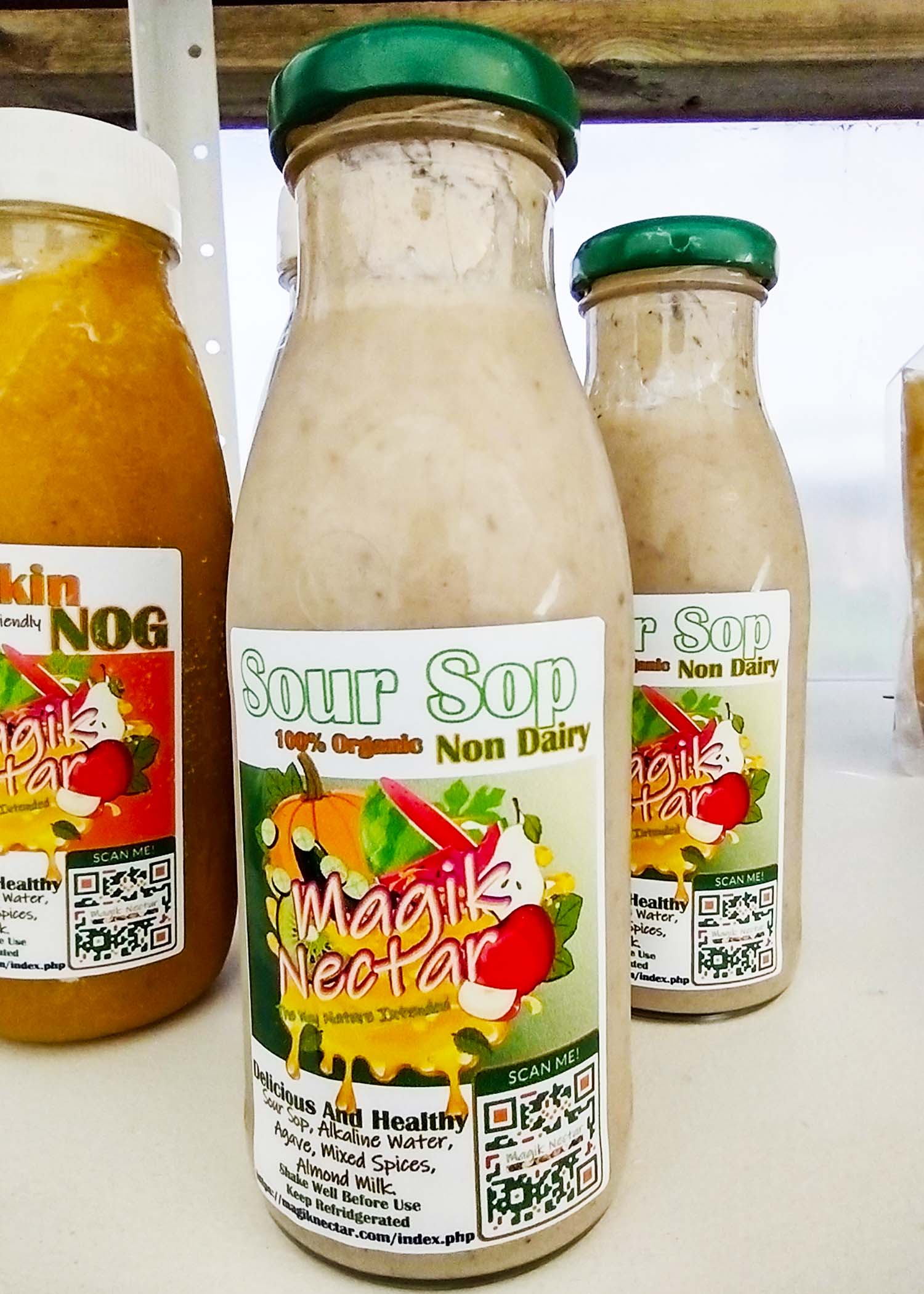Product Details

Benefits
Organic Sour Sop
Alkaline water
Agave
Mixed Spices
Almond Milk

Sour Sop £5.00
-
Best Quality
Standards -
Natural Healthy
Products -
The Smart
Choice
Health is paramount to what Magik Nectar do. Yes, our choice of Juices are delicious; however health benefit is our main motivator. delicious is a byproduct of doing it The Way nature Intended.
Health is paramount to what Magik Nectar do. Yes, our choice of Juices are delicious; however health benefit is our main motivator. delicious is a byproduct of doing it The Way nature Intended. Some of you might be aware of the Sour Sop Fruit, other might not, For those of you who are unaware... read more
Choose Juice Size:
Choose Quantity
-
Best Quality
Standards -
Natural Healthy
Products -
Smart Oragnic
Services
Health is paramount to what Magik Nectar do. Yes, our choice of Juices are delicious; however health benefit is our main motivator. delicious is a byproduct of doing it The Way nature Intended.
Health is paramount to what Magik Nectar do. Yes, our choice of Juices are delicious; however health benefit is our main motivator. delicious is a byproduct of doing it The Way nature Intended. Some of you might be aware of the Sour Sop Fruit, other might not, For those of you who are unaware Sour Sop is a super food, one you should consume whever you have the oppotunity to. The people who are aware of this magnificent fruit also know that Sour Sop makes one of the most delicious juices on the planet, but what none of you are aware of (unless you've had Magik Nectar's Sour Sop Juices) is that Magik Nectar's Sour Sop Juices are made like no other.
A native of the warm and tropical regions of the Americas, soursop is a fruit that goes by many names. Its scientific name is Annona muricata, but it also goes by guanabana, paw-paw, sirsak, and graviola. Soursop is a member of the Annonaceae family, also known as the custard apple family. The fruits, which grow on trees, are large and oval-shaped. The green exterior, which has spines on it, covers a white, fibrous flesh. They grow up to 8 inches and can weigh up to 10 pounds. Soursop’s flavor can best be described a cross between mango and pineapple Soursop has many uses in traditional medicine, and it has been used to treat a wide range of health conditions and ailments. With its strong nutrient profile, it provides a variety of health benefits. Health Benefits Soursop is high in vitamin C, an antioxidant known to boost immune health. The vitamin strengthens your immune system, improving its ability to defend against pathogens. It also promotes the destruction of free radicals, which can help to protect your skin and cells from environmental oxidative damage. One whole soursop fruit contains 215% of your recommended daily allowance of vitamin C. Soursop (the fruit and the leaves) contains many other antioxidants, including phytosterols, tannins, and flavonoids. Antioxidants play a role in your overall health and may help to protect against a variety of health conditions. Other health benefits of soursop include: Healthy digestion One whole soursop fruit contains around 83% of your recommended daily allowance of fiber, which is a vital nutrient for your digestive health. Fiber helps to promote regularity and prevent digestive issues such as constipation. Potential anti-carcinogenic effects While most research is limited to test-tube studies, soursop may be beneficial in helping to fight and prevent cancer. One study found that a soursop extract could reduce the size of breast cancer tumors and kill cancer cells. A second study found that an extract could stop the formation of leukemia cells. Fights inflammation Antioxidants fight free radicals, reducing the damage to your cells caused by oxidative stress. One of the side effects of oxidative stress is inflammation. The antioxidants in soursop may, therefore, help to reduce inflammation in the body. RELATED: Video: How to Build a Balanced Meal Stabilizes blood pressure High blood pressure may lead to serious issues like heart disease and heart attack. A contributing factor to high blood pressure is sodium intake. Potassium helps your body to get rid of sodium and eases the tension in the walls of your blood vessels, both of which can help to lower your blood pressure. A whole soursop fruit offers approximately one-third to one-half of your recommended daily allowance of potassium. May fight against bacteria Soursop may provide antibacterial effects. One study found that an extract may be able to kill many different types of bacteria, including strains that cause gum disease and cavities. Another study found that soursop extracts may help to fight cholera and Staphylococcus bacteria. While these were test-tube studies, the results are promising, and further research is needed. Nutrition Soursop contains many essential vitamins and minerals, including: Vitamin B1 Vitamin B2 Vitamin B3 Vitamin C Folate Calcium Iron Potassium Magnesium Phosphorous Zinc Copper Nutrients Per Serving One entire soursop fruit provides: Calories: 413 Protein: 6 grams Fat: 2 grams Carbohydrates: 105 grams Fiber: 21 grams Sugar: 85 grams Things to Watch Out For While soursop can offer significant health benefits, it does have some potential drawbacks. Studies have shown that the fruit and tea made from the leaves may cause symptoms similar to Parkinson’s disease. Studies also indicate that it may interact with high blood pressure medication or medications for diabetes. The compounds in the fruit may strengthen the effects of such medications, causing dangerous drops in your blood pressure or blood sugar levels. You should also avoid eating soursop seeds. They have toxic compounds and may cause harmful side effects. Be sure to remove them before eating the fruit. How to Eat Soursop You’ll likely find fresh and frozen soursop in Brazilian grocery stores. You may also find the fruit in some conventional grocery stores or online. Most soursop is picked before the fruit is fully ripened. While the unripe fruit is green, it turns to a yellow-green to indicate maturity. It will also give a little when you press on it. Store unripe fruit on the counter. Once mature, you should store it in the refrigerator and use it within a few days. Soursop is delicious raw. You can also use it in many different ways, such as: Homemade popsicles Ice cream A sweet addition to your favorite smoothie recipe Juices A topping for to oatmeal, yogurt, or chia pudding A zesty addition to a quick bread or cake.
Hailing from the warm and tropical regions of the Americas, soursop is a versatile fruit known by various names. Scientifically labeled Annona muricata, it's also recognized as guanabana, paw-paw, sirsak, and graviola.
Belonging to the Annonaceae family, commonly referred to as the custard apple family, soursop trees bear large, oval-shaped fruits. Encased in a spiny green exterior, these fruits yield a white, fibrous flesh, reaching sizes of up to 8 inches and weighing as much as 10 pounds. The flavor of soursop is often likened to a blend of mango and pineapple.
Soursop boasts an extensive history of traditional medicinal use, offering a spectrum of health benefits thanks to its robust nutrient profile.
Health Benefits
Rich in vitamin C, a potent antioxidant renowned for bolstering immune function, soursop enhances the body's defenses against pathogens while combating environmental oxidative stress. A single soursop fruit provides a whopping 215% of the recommended daily intake of vitamin C.
Moreover, soursop, both in its fruit and leaf forms, contains an array of antioxidants such as phytosterols, tannins, and flavonoids, contributing to overall health and potentially shielding against various ailments.
Additional health benefits of soursop include:
-
Healthy Digestion: A single soursop fruit offers approximately 83% of the daily fiber requirement, vital for digestive health by promoting regularity and preventing issues like constipation.
-
Potential Anti-Carcinogenic Effects: While primarily studied in vitro, soursop exhibits promising potential in combating and preventing cancer. Research suggests it may reduce tumor size in breast cancer and impede the formation of leukemia cells.
-
Inflammation Reduction: Soursop's antioxidants combat free radicals, mitigating cellular damage caused by oxidative stress, thereby potentially reducing inflammation in the body.
-
Blood Pressure Regulation: Soursop's potassium content aids in flushing out sodium from the body, easing tension in blood vessel walls, and thereby helping to lower blood pressure. A single soursop fruit offers approximately one-third to one-half of the daily potassium requirement.
-
Antibacterial Properties: Studies indicate soursop extracts may possess antibacterial properties, capable of combating various bacteria, including those responsible for gum disease, cavities, cholera, and Staphylococcus infections.
Nutrition
Soursop is rich in essential vitamins and minerals, including vitamins B1, B2, B3, C, folate, calcium, iron, potassium, magnesium, phosphorous, zinc, and copper.
Nutritional Content per Serving
- Calories: 413
- Protein: 6 grams
- Fat: 2 grams
- Carbohydrates: 105 grams
- Fiber: 21 grams
- Sugar: 85 grams
Considerations
Despite its health benefits, soursop may pose some risks. Studies suggest that consuming soursop fruit or leaves may induce symptoms resembling Parkinson's disease and could interact with medications for high blood pressure or diabetes, potentially leading to dangerous drops in blood pressure or blood sugar levels. Additionally, soursop seeds contain toxic compounds and should be avoided.
Consumption Tips
Fresh or frozen soursop can be found in Brazilian grocery stores or occasionally in conventional markets or online. Unripe soursop should be stored at room temperature until it ripens, at which point it can be refrigerated and consumed within a few days. Soursop can be enjoyed raw or incorporated into various dishes, such as homemade popsicles, ice cream, smoothies, juices, or as a topping for oatmeal, yogurt, or baked goods.
One the most common nutricianal deficiencies in people today is fibre and to help counterct that Magik Nectar has created delicius juices with very high fibre content.
An almond is a seed from a fruit that grows from an almond tree. The fruit holds a hard shell, like a pit, with the almond seed inside. Although technically seeds, almonds are considered nuts. People all over the world have been eating almonds for thousands of years. Today, about 80% of almonds are produced in California. You can find almonds in foods and even as added flavor in drinks around the world. If you’re looking for an addition to your diet that packs a healthy punch, a small serving of almonds from time to time can make a big difference. Nutrition Like many nuts, almonds provide plenty of nutrients. Nutrients per serving An ounce of whole almonds contains: Calories: 152 Protein: 6 grams Fat: 15 grams Carbohydrates: 6 grams Dietary fiber: 3 grams Sugar: 1 gram Almonds are also an excellent source of vitamins and minerals such as: Vitamin E Vitamin B2 Magnesium Phosphorus Potassium Portion size It’s easy to eat too many, which could mean you’re getting more calories and fat than you need. A healthy serving is 1/4 cup, or about 23 almonds. Health Benefits of Almonds The dense nutrition that almonds provide can benefit your body in a number of ways. If you're looking to strengthen your heart, your bones, or even your libido, almonds may help. Almonds could help you: Lower cholesterol Eating almonds helps to lower levels of the bad kind of cholesterol, called low-density lipoprotein (LDL), and increase levels of the good kind, high-density lipoprotein (HDL). Almonds also have anti-inflammatory properties to help protect you from heart disease. Keep a healthy weight Although they're high in calories, almonds could help to reduce your risk of weight gain and obesity — as long as you pay attention to portion size. The protein and fiber in the nuts helps you feel full faster, so you can better control your calorie intake while still satisfying your hunger. Lower blood pressure The vitamin E, potassium, and calcium in almonds could help to lower your blood pressure, which helps protect against heart disease. RELATED: Surprising Reasons You're Gaining Weight Get essential vitamins, minerals, and fiber Almonds are rich in important nutrients for your body, including magnesium, vitamin E, and fiber. Strengthen bones Almonds have both calcium and phosphorus, which are good for bone health. Improve blood sugar control Almonds seem to help curb blood sugar spikes after meals, which is key for people with diabetes. Improve gut health Recent research appears to suggest that almonds may help protect the health and immunity of your gastrointestinal (GI) tract. A healthier gut means a better immune system and a stronger body.
An almond originates as the seed of a fruit grown on the almond tree. Encased within a tough shell akin to a pit, the almond seed is nestled inside the fruit. Despite their classification as seeds, almonds are commonly regarded as nuts.
For millennia, almonds have been a dietary staple worldwide. Presently, approximately 80% of global almond production transpires in California. Almonds feature prominently in various cuisines and are often used to enhance the flavor of beverages.
Incorporating almonds into your diet sporadically can offer significant nutritional benefits.
Nutritional Value
Almonds boast a rich array of nutrients, typical of many nuts. Per serving:
- Calories: 152
- Protein: 6 grams
- Fat: 15 grams
- Carbohydrates: 6 grams
- Dietary fiber: 3 grams
- Sugar: 1 gram
Moreover, almonds serve as an abundant source of essential vitamins and minerals, including:
- Vitamin E
- Vitamin B2
- Magnesium
- Phosphorus
- Potassium
Serving Size
It's crucial to moderate intake, as overconsumption can lead to an excess of calories and fat. A recommended serving size is 1/4 cup, equivalent to roughly 23 almonds.
Health Benefits
Almonds offer dense nutrition, imparting various health advantages to the body. These benefits encompass cardiovascular health, bone strength, and potentially even libido enhancement.
-
Lower Cholesterol: Almonds aid in reducing levels of LDL (low-density lipoprotein) cholesterol while elevating HDL (high-density lipoprotein) cholesterol, thus mitigating the risk of heart disease. Additionally, almonds possess anti-inflammatory properties that contribute to cardiac protection.
-
Weight Management: Despite their calorie density, almonds can help stave off weight gain and obesity when consumed in moderation. Their protein and fiber content promotes satiety, facilitating better control over calorie intake without sacrificing satisfaction.
-
Blood Pressure Regulation: The presence of vitamin E, potassium, and calcium in almonds supports blood pressure regulation, which is pivotal for cardiovascular health.
-
Nutrient Richness: Almonds are abundant in vital nutrients such as magnesium, vitamin E, and fiber, crucial for overall well-being.
-
Bone Health: With their calcium and phosphorus content, almonds foster bone strength.
-
Blood Sugar Control: Almonds demonstrate the potential to attenuate blood sugar spikes post-meals, particularly beneficial for individuals with diabetes.
-
Gut Health Improvement: Emerging research suggests that almonds may contribute to gastrointestinal tract health, bolstering immunity and overall bodily resilience.

